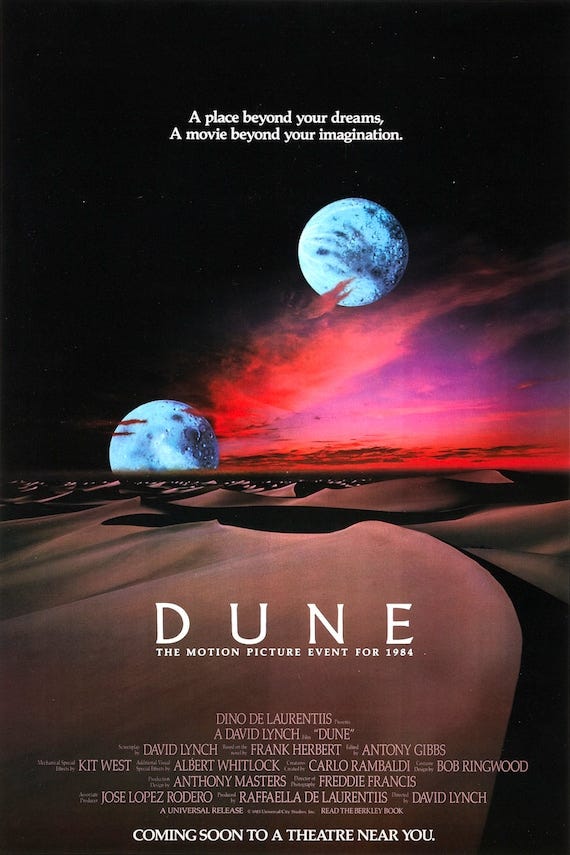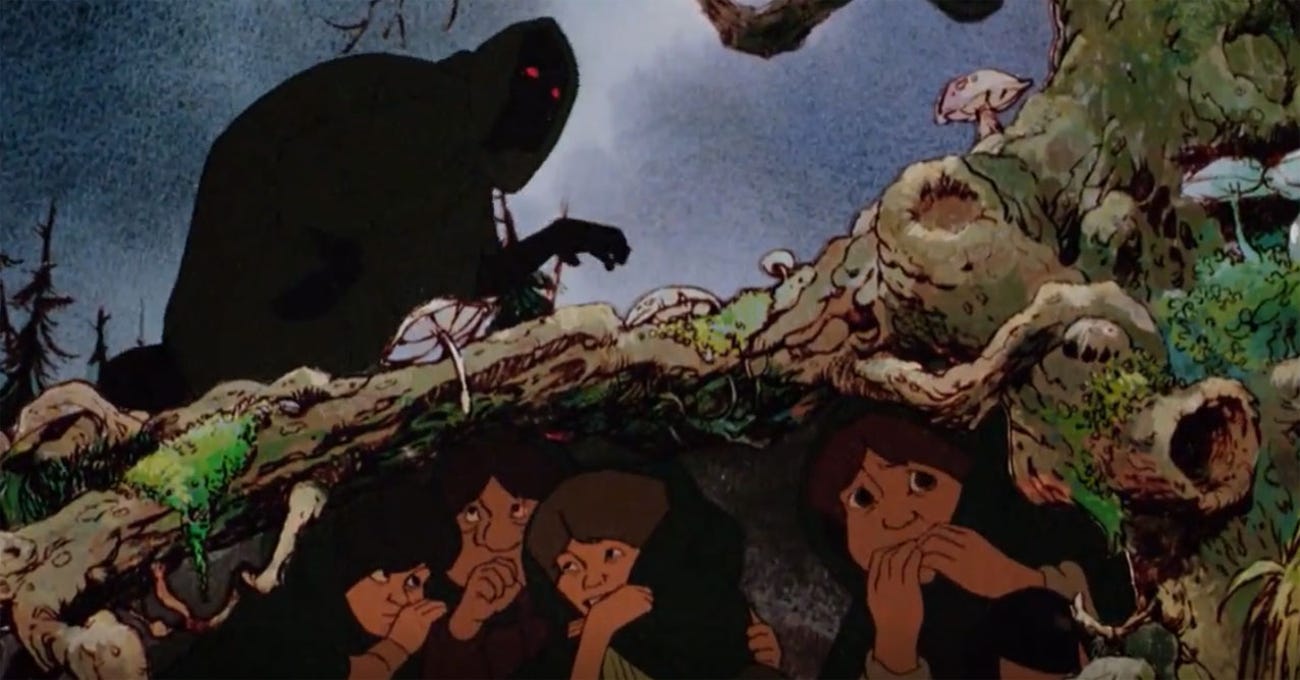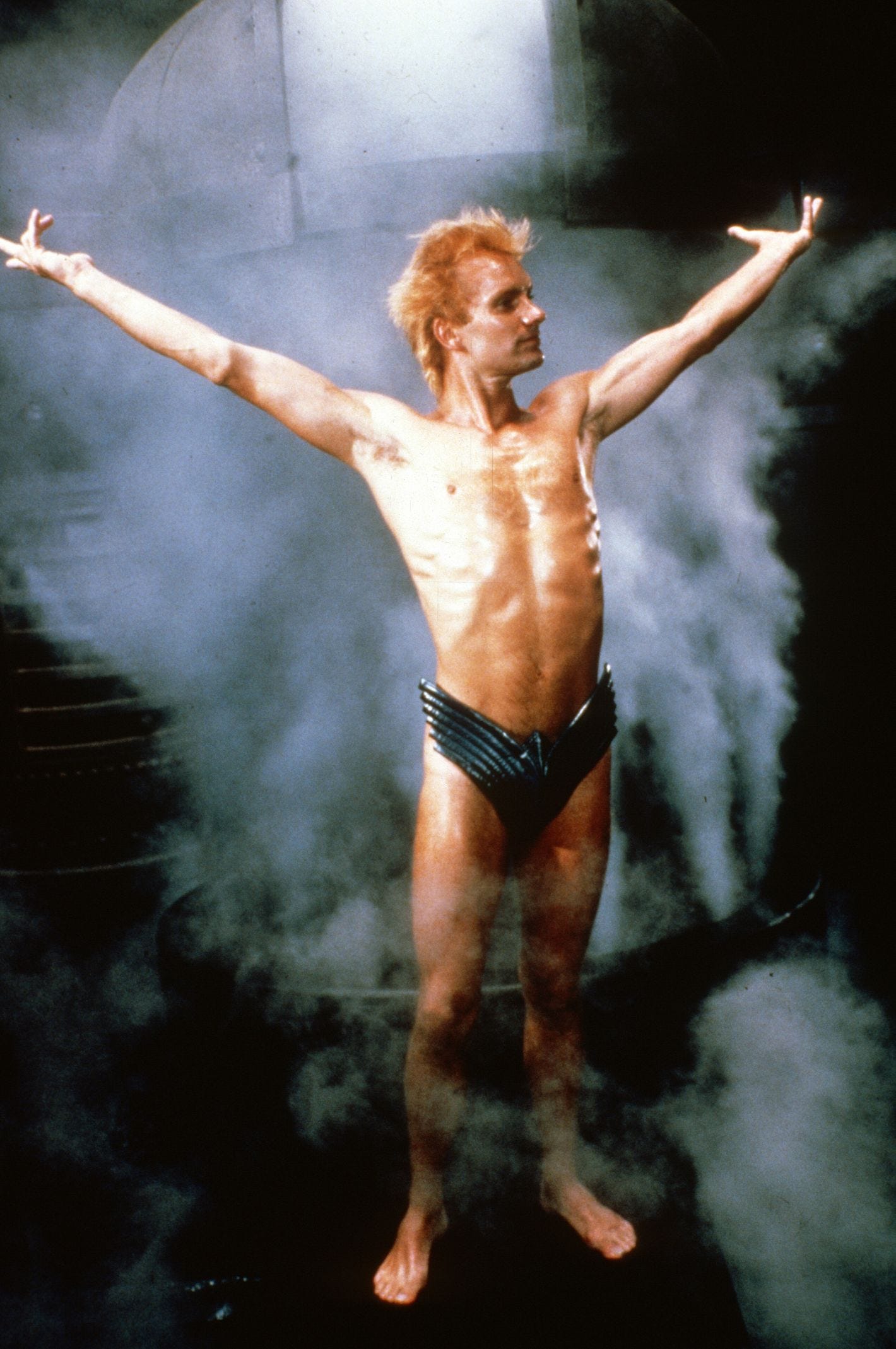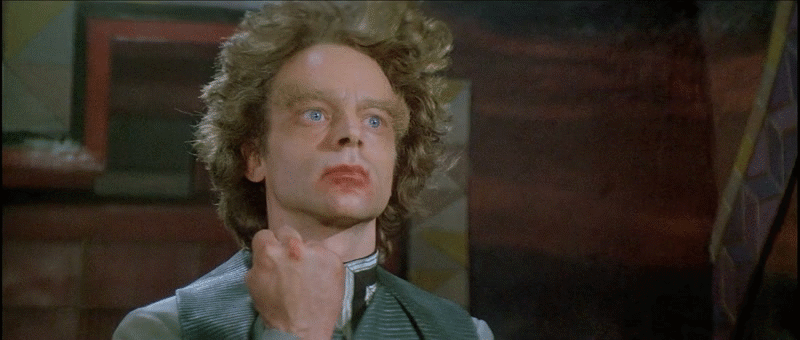David Lynch's DUNE (1984) (and comparing to Dune 2021)
(So... I briefly had a Substack - I don't need to link it here, you crafty internet House MDs can figure out how to find it - and I think I'll just bring over my posts over here since, frankly, I'd prefer to emphasize posts on here since this is actually year 15 of the blog and... that's something to keep doing!
So... ::WAVES FINGERS AND TALKS ABOUT IDEAS:::)
Time for some 40th anniversary theatrical spice and rides on the Lychian sandworms. Let's see if I raise (or lower) my rating on this only 2nd time seeing this... ::putting my hand in the popcorn bucket err box:: And, yeah, it'll stay.
Well, it is by will alone I set my moviegoing in motion 😎 💧 🪱
Seeing David Lynch's Dune again after so many years - and, while still being One of Those Books (that I've started like four times and need to finish someday I swear Goodreads/Audible I will) I have nonetheless seen the Villeneuve film of the first half of the adaptation - aside from admiring many aspects of it when in a full large theater setting more than I did previously, it makes me at the same time quite more excited for the part 2 Villeneuve film due out in a few weeks.
This isn't a one to one comparison, but I'm reminded greatly of how Villeneuve with his film(s) is to Lynch's film what Peter Jackson's Lord of the Rings is to the Ralph Bakshi animated version. Both latter, more modern-day directors, seem to understand that for their material to be on a truly grand and entertaining and at the same time, hopefully, accessible scale, they need to let the material breath a little more.
Curiously for me, both the Bakshi film and Lynch's film have some curious and interesting correllations: both films were trying for heights of ambition that were just too far out of grasp for their respective auteurs, and some of that could have been (no, scratch that, was) due to studio interference, but it's also from some of the dangers of adapting such gigantic texts in their respective times. And both films have this in common: the first half of Bakshi's LOTR is quite strong and often brilliant, because it manages to focus pretty firmly on Fellowship... and then struggles more on story grounds when it tries to cram Two Towers into like half an hour or so. Dune also has a compelling first half, and if you watch this in relation to the Villeneuve 2021 film, there are whole parts, whole lines even, that are the same.
But, whether it was from Lynch knowing he was in trouble in the writing stage, or the filming, or in the arduous post production (we know, it was a combination of the three), for all the absorbing direction, performances (beyond absorbing, extreme and uncanny), for all of the vast and intricate and brilliant production design and the surrealistic brush strokes (and some that we do see in the "Water of Life" in the second half, a highlight of the film overall to be fair), once Paul and Jessica crash into the desert of Arrakis and have their sudden and portentous meeting with the Fremen, the storytelling becomes... wonky, janky, ungainly, like fitting five hundred pounds of sandworm blubber into a five pound bag (they have blubber right? Sure they do, OK I Arrakisgress).
I've talked with friends who have read the book and find the most egregious change is what is revealed with Paul as the "true" Quitzach hadarach (sic), which is a departure and one could say betrayal of what happens in the book (or its more ambiguous there, any of you on LB please feel free to correct me). That isn't an issue so much for me, it doesn't change his level of power or heights as the Grand Hero of this journey, as it is that it is revealed in the literal final seconds of the movie, and is emblematic of the problem to the film, which is giving you so much information and details in rapidity, like "and then they spent two years fighting blah blah and little sister grew and..." uh huh. Where's the air to breathe?
(So much Stingdom)
This is what I mean by being excited for the Villeneuve film; I can't be entirely sure where he will take similar material, and only can hope he will take certain semi-iconic set pieces (Paul gaining his confidence with worm riding is jn the trailer, but Paul's confrontation with Feyd Rautha should be something else). But if Dune 1 is any indication then it should be a place where this rich material has time to enrich the characters and relationships (another example, Sean Young, who is striking as the great love of Paul's Fremen life, seems so underdeveloped as to be a prop for his bits of growth and self doubt), or to simply make the Fremen a more (only word I got) powerful and humane presence than Lynch's masses of hordes of figures.
If it sounds like I'm going off on Lynch's Dune hard, I don't mean to be; as I said earlier, there's many things about Lynch's vision and decisions, largely within singular scenes if not in terms of plot, that are intense and satisfying and detailed with purely odd strokes. It may also be some nostalgia for a period that no longer exists, the Analog Adventure Epic (and even more than science fiction, as purr Adventure Pulp this material is good no matter in who's hands), but it's more than that.
Lynch is at the proverbial top of the heap of American Surrealists and artists in mediums that stretch from filmmaking to, um, crafting doors and wood and so on, and he and his team created some harrowing, thoughtful and just crazy designs; the weird... what the fuck is that little Membrane in a Tank that says what's what to the Emperor is one thing, as are the visions of water (maybe some of the most breathtaking water in modern film?)
I even liked (if not loved) how much he used narration here this time, which was a hindrance when I saw this like decades ago to feeling into a scene, because it does give many characters, even side ones, this sense that "there's something deeper and more prophetic going on in this town... let's see what this Paul guy can do," and Lynch populates this with a bevvy of gloriously BIG character actors (and pugs!) Brad Dourif, Kenneth McMillan and Dean Stockwell clear highlights.
I could go on, but I'll just leave it that this experience seeing Dune made me appreciate it a little more as, compromised as hell as it is, a David Lynch vision of power games and Intrigue and soul searching and, most importantly, mythmaking. As much as this not quite how it could have been (to the point that Lynch rarely talks about it outside of his memoirs), I do think it likely served as a major turning point for Lynch: would we have the grand surrealist Mythology of Twin Peaks if he hadn't gotten his feet muddy in the deserts and waters Arrakis? And with MacLaughlin and his own performance growing more confident as the film goes on? (One of the pleasures of the 2nd half of the film) who's to say?
Maybe I need some more of that Brad Dourif character drink to know how to keep my moviegoing will in motion...






Comments
Post a Comment